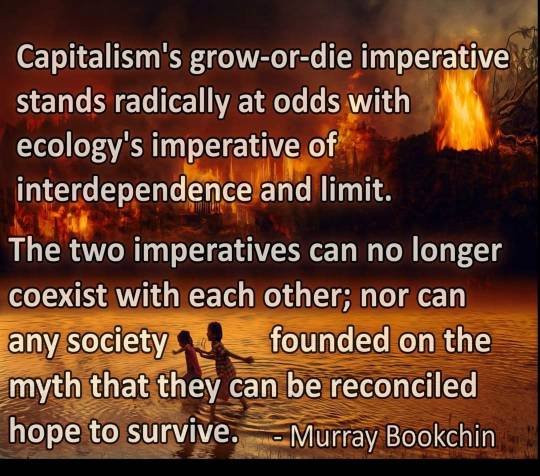#bookchin
Text
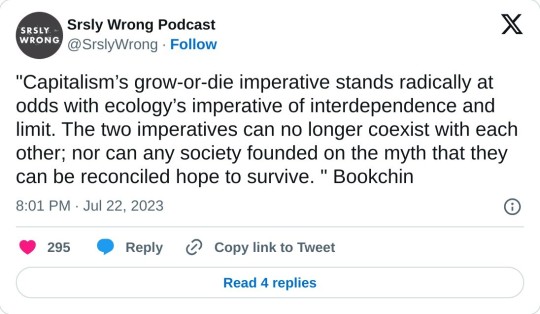
7 notes
·
View notes
Text
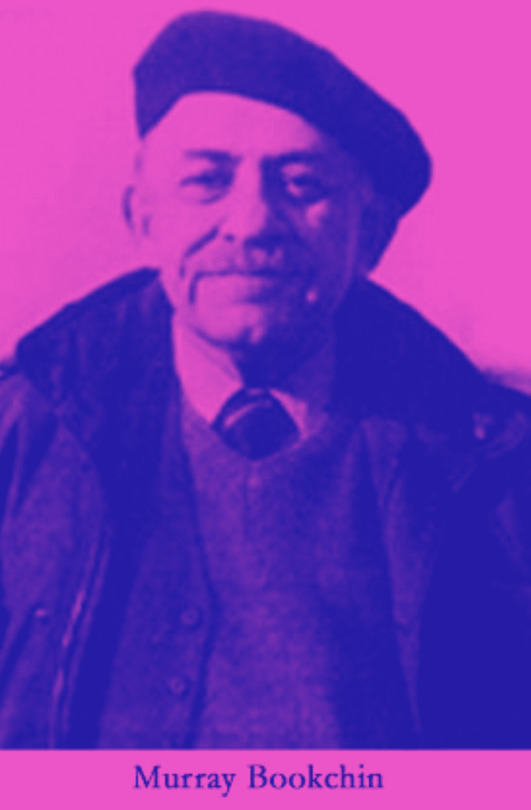
"What compels me to fight this society is, of course, outrage over injustice, a love of freedom, and a feeling of responsibility for perpetuating and enlarging the human spirit — its beauty, creativity, and latent capacity to improve the world."
— Your kindly Anarchist grandpa
#murray bookchin#anarchism#anarchist#anarcho syndicalism#anarchopunk#ecology#social ecology#municipalism#communalism#municipal communalism#bookchin#radical literature#labor rights#workers of the world unite#labor#pink and purple#hot pink#philosopher#beret#beret hat
36 notes
·
View notes
Text
sometimes when i have days i'm too depressed to move, i remember that i can just listen to murray bookchin talk about how good it is to just live in a city and how important it is to take them back by being active members on the damn ground and it doesn't get me out of bed or nothin but damn i wish i coulda met him, glad to have access to his recordings.
4 notes
·
View notes
Quote
Rarely is history notable for its capacity to select and preserve the most virtuous traits of humanity.
Murray Bookchin (author, The Ecology of Freedom: The Emergence and Dissolution of Hierarchy)
#philosophy#history#bookchin#qualitative rationality#democratic socialism#community#social ecology#murray bookchin#ecology of freedom#dissolution of hierarchy#social control#technology and civilization#political science#humanity#virtue
2 notes
·
View notes
Note
Are the Kurds communist? If they are why do they work with the USA?
Saying all Kurds are Communists is like saying all Palestinians are Communists. It's a blanket statement that helps no one.
#if you're referring to Rojava then no they're not Communists in the ML sense they are Democratic confederalists#which is based on Bookchin's theory of Communalism and some elements of libertarian socialism
53 notes
·
View notes
Text


#civilization#murray bookchin#book is cities without urbanisation#anarchism#social ecology#anthropology#urban planning#urbanism
61 notes
·
View notes
Quote
Human society evolves out of the strictly zoological world of first nature, and is no less a part of the biosphere than are pods of whales or flocks of birds. The issue is therefore not humanity or civilization per se, but a particular hierarchical, colonial, capitalist society which simplifies and interrupts Earth systems to the detriment of humanity and other species. “[I]f we are not to sink into the fatuities of romanticism and mysticism,” Bookchin argues, then the question is “not whether humans should intervene into nature…but how they should intervene and toward what ends." The structure of our society inexorably determines our ontological outlook and subsequently our relations with the rest of nature; we can design it to function in reciprocity with the rest of the natural world, or in conflict with it. Our task is not to return to an idealized past, or to fetishize and appropriate the cultures of Indigenous peoples. Rather it is to determine which aspects of the current dominant society bring us into conflict with the rest of the natural world, to identify the historical junctures out of which these characteristics arose, and to imagine alternative paths society could take. In this endeavor, societies which have developed along more ecological paths are indispensable resources.
Nathaniel Owen, Decolonizing Nature: How “Wilderness” Dispossesses Indigenous People
256 notes
·
View notes
Text
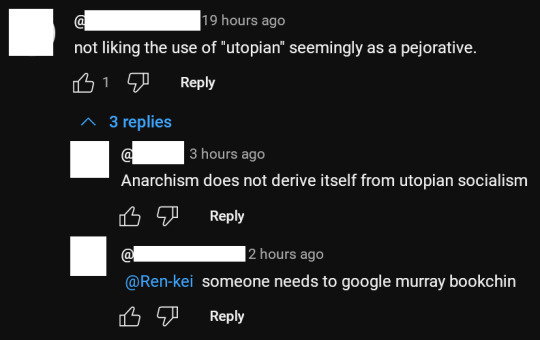
three line poem
89 notes
·
View notes
Text
youtube
A really good, albeit not in-depth, summary and introduction to Bookchin's ideas.
Highly recommend listening if you're at all interested in ecosocialism or green anarchism
42 notes
·
View notes
Text

#plenty#abundance#scarcity#the only tragedy of the commons was its enclosure#fuck capitalism#murray bookchin#anarchy
632 notes
·
View notes
Text
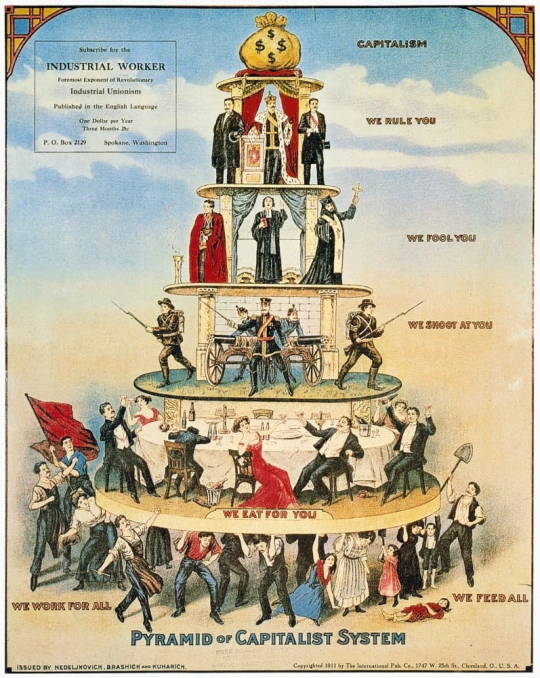
The trick of every ruling elite from the beginnings of history to modern times has been to identify its own socially created hierarchical systems of domination with community life as such, with the result being that human-made institutions acquire divine or biological sanction.
— Murray Bookchin, Remaking Society
22 notes
·
View notes
Quote
Every organisation (however revolutionary its rhetoric and however well intentioned its goals) which models itself structurally on the very system it seeks to overthrow becomes assimilated and subverted by bourgeois relations. It's seeming effectiveness becomes the source of its greatest failure.
Murray Bookchin “Anarchy and Organisation: A Letter to the Left” (1969)
#@ppl inviting me to join their boards of management.#this is my criteria#last year i made a post about nonprofit brain rot and this is exactly what i mean#organisations that think they can save the world while subjugating their workers#brain. worms.#Murray Bookchin#like how u can't hate yourself into someone you'll love#me fein#politics
122 notes
·
View notes
Text
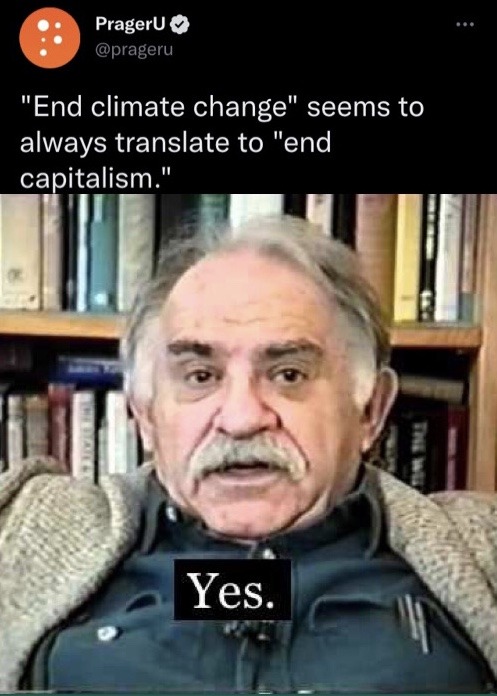
10K notes
·
View notes
Text
He talked about returning so many things to the hands of the people, like economic power. He thought that the economy needed to be put in the hands of bottom up, self-governing bodies based on the assembly. He wanted technology to be decentralized—he would have loved Apple computers, maybe not the company, but the decentralization that the laptop computer brought about was just remarkable to him. He wanted automation to be small scale. It was about decentralizing and breaking up cities to small-scale cities that are integrated with agriculture.
So, the theme that I found when I was working on the biography was so many of his ideas were about decentralizing different parts of society and reintegrating them into a new whole. I call it eco-decentralism in the book, but that’s not a term he used. It was decentralizing for the purpose of restoring control to people. When I looked at what happened with him and anarchism, I wondered, “Why was he attracted to this ideology that he later broke with?” When I read his actual reasons for embracing anarchism in his earlier writings, I noticed that it’s because the state makes people passive. He admired that active political engagement in the Athenian polis, where people could actively be involved in their society, rather than be passively turned into anonymous faceless crowds of the New York that he was living in.
And I think, regardless of what you think about anarchism or not, that’s something that we need to preserve from him. He agreed with Aristotle that we are political animals and we need to engage. That was, I think, one of his main driving features was to create the engaged citizen, engaged at the local level, and in the surrounding regions, instead of just turning over their minds to the state.
53 notes
·
View notes
Text
"Whether as drama, novel, science fiction, poetry, or an evocation of tradition, experience and fantasy must return in all their fullness to stimulate as well as to suggest."
Murray Bookchin (author, The Ecology of Freedom: The Emergence and Dissolution of Hierarchy, 1980)
#writeblr#writing#fiction writing#novel writing#poetry#literary tradition#intellectual stimulation#fantasy writing#writing tips#writing advice#quote#murray bookchin#the ecology of freedom
29 notes
·
View notes
